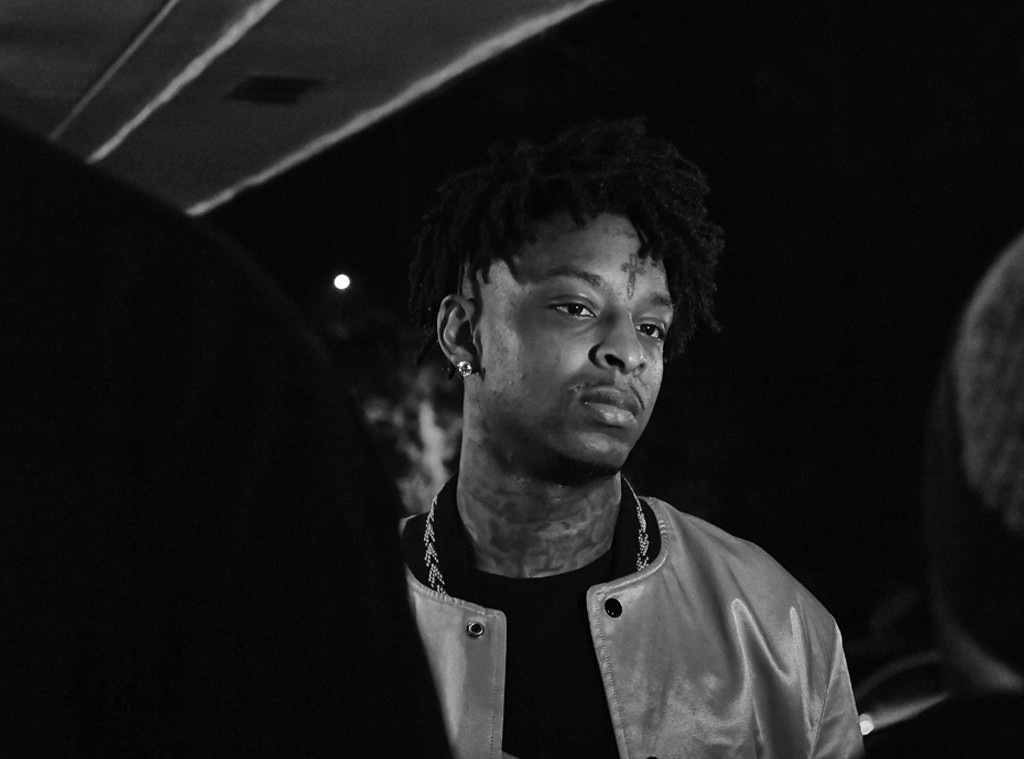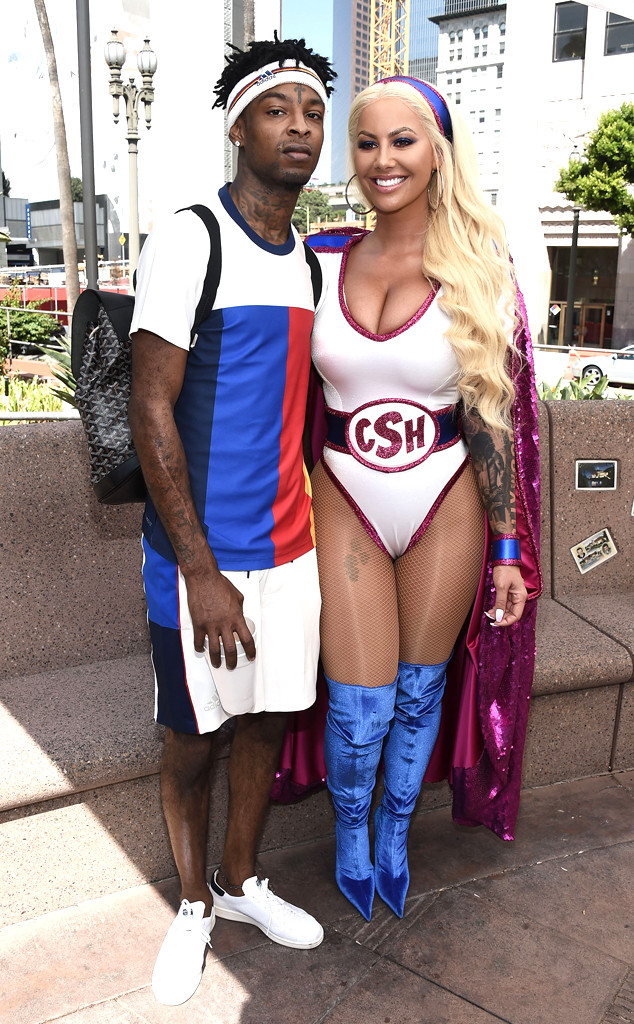“21 Savage is important because he’s one of the last real street n—as left making music.”
That’s how rapper and music producer Metro Boomin referred to the Grammy-nominated recording artist and songwriter born She’yaa Bin Abraham-Joseph in a 2015 interview with The Fader following the release of his debut mixtape, The Slaughter Tape.
And since Savage burst onto the Atlanta music scene over four years ago, that’s been the general consensus from fans and music critics alike; that this was an artist who took a life that was going down a decidedly deadly path—one that saw him shot six times by a rival gang on his 21st birthday—and turned it around to mine the depths of that danger in his highly-autobiographical music.
But all that authenticity was thrown into question on Sunday, Feb. 3 when the rapper who Interview magazine presented as “Atlanta-born” in 2018 was taken into custody by U.S. Immigration and Customs Enforcement with the intention to deport, accusing the 26-year-old of being a British national who’d been in the States unlawfully since his nonimmigrant visa expired in 2006.
“His whole public persona is false,” an ICE spokesperson told CNN. “He actually came to the U.S. from the U.K. as a teen and overstayed his visa.”
Suddenly, a life that seemed ripe for the Hollywood biopic treatment has some wondering if parts of this script were already written.
The lore surrounding Savage, the story that we’ve all accepted as fact since is breakthrough, is something like a Greek tragedy by way of Atlanta—albeit one with a silver-lining twist to the story. It was the story of a boy who, as he told The Fader in 2016, saw his first gun when he was only eight years old, a .38 revolver shown to him by his uncle Dae Dae. A boy who grew up in a lot of “beat-up a– apartments” in Atlanta with his four brothers, six sisters, mom Heather, and his mom’s boyfriend. A boy who, after bringing a gun to school in seventh grade, was banned permanently from every school in the DeKalb County School District, went to a youth detention center, and dropped out of school altogether only a semester into high school.
“Next thing you know, it was weed, weed, weed,” he told The Fader of his transition to street activities. “Crack. And robberies.”

Prince Williams/WireImage
As his self-mythologizing went, he was selling drugs and stealing, well, just about everything. “I used to rob the hell out of everybody,” he told GQ in 2018. “If you had it, if it was worth something, I’d take it.” Including, he claimed, cars. At 19, he lost his “left hand” Larry when he was shot and killed in a 2011 shootout. In 2013, during a drug deal gone wrong on his 21st birthday, his best friend Johnny was shot dead, while he was shot six times himself. The nearly-fatal moment is recounted in the 2016 Fader feature not by Savage—”He is cagey about recalling the incident,” the author notes—but by one of his friends when the rapper is out of earshot, telling “the version of the story he’d always heard.”
“That a deal turned into an attempted robbery,” the author writes. “That there were two assailants. That Johnny got shot in the head. That Savage, wounded, tried to shoot back. That afterward he shut Johnny’s eyes, got out of the car, closed the door, lit a cigarette, and waited nearly 30 minutes for the ambulance to come.”
Around that time, he was also arrested on felony charges when he was riding passenger in a car pulled over for making an illegal turn across four lanes of traffic. According to he Atlanta PD report obtained by E! News, the arresting officers confiscated a mason jar containing 22.6 grams of marijuana, a Glock .40 and a Ruger .9mm (both loaded with a round in a chamber), a large unlabeled bottel containing 89 pills of the opioid hydrocodone, $1,775 in cash, and a scale “recovered on the middle console in plain view.”
“It wasn’t my fault, though, and I done sold every drug, robbed every—I did everything there is to do, except rob a bank. I swear to God on my life I did everything in between. And I ain’t never go to jail for that shit,” he told GQ of the 2014 arrest, before clarifying, exactly, what wasn’t his fault. “It wasn’t my fault that we got caught.”
Around this time, his infamous dagger face tattoo was inked right between his eyes, a tribute to his younger brother Quantivayus, who everyone called “Tayman.” As he told The Fader, Savage and his brothers had agreed to get tatted in the same place as Tony Montana in Scarface, between the thumb and index finger, but Tayman jumped the gun and got it right on his face. After he was shot and killed in another drug deal gone wrong, Savage did the same. “He was a real wild n—a,” he told the magazine. “Little wild n—a. Hothead. bat out of hell, bad as hell.”

Paras Griffin/Getty Images
With all of this pain to mine for material, he turned to the recording studio. “I wasn’t like, ‘I got shot, I’m finna be a rapper,'” he told The Fader in 2016. “S–t. I just started taking my goddamn dope money and spending it on studio time.”
“I couldn’t really do nothing else,” he told Seth Rogen during a 2018 chat for Interview. “When I got shot there wasn’t really nothing else for me to do, because I couldn’t really move around the way I wanted to. So I was either in the house or in the studio.” Though, notably, it’s here where a bit of Savage’s origin story shifts.
“Just started going to the studio after I got out the hospital,” he continued. “My best friend who died, his uncle had a whole lot of dope money, so he started buying me studio sets and shit.”
(Inconsistencies like this aren’t uncommon if you compare different Savage interviews. Take his feelings on planes, for example. In The Fader piece from 2016, he’s said to have an avoidance of planes that “some observers have speculated” stems from a “desire to avoid showing ID at the airport,” but Savage chalks up, simply, to being afraid to fly, centering his fears on either crashing or getting hijacked. By the time the 2018 Interview piece comes around, he’s “been captivated by planes since he was young, and over the last few years, he’s worked hard to acquire a pilot’s license,” the introduction reads. “I got ten hours on my private,” he tells Rogen as they chat about his skyward ambitions.”)
Regardless of who was funding those early days in the studio, for the life-long practitioner of the West African religion Ifa—which he described in the Interview piece as “basically just paying respect to your ancestors, including them in your life, letting them guide you through life, that’s basically it”—his shooting was a wake-up call.
“I had to change. I was a wild n—a. And I knew one day karma was gonna come back around,” he told GQ. “So when I got shot, I was like, All right, this is my sign. I’m getting a second chance or some s–t.“
His debut single, “Picky,” dropped in November 2014. By the next May, following the release of The Slaughter Tape, he was being hailed as an underground hero in Atlanta. And when he and Metro Boomin dropped their joint EP Savage Mode in July 2016, the entire world was watching. Come January, he’d sign with Epic Records, which, in turn, would lead to a debut solo album, Issa Album, dropping at No. 2 on the US Billboard 200, a feature on Post Malone‘s “Rockstar,” and a collaborative album with Cardi B‘s man Offset. He’s linked up with Drake and Cardi herself on tracks like “Sneakin” and “Bartier Cardi.”
And he started to try and do some good in the world, too. In 2018, he reportedly started a movement called “Guns Down, Paintballs Up,” which was intended to reduce gun violence by suggesting people use paintball guns instead of lethal firearms. And when the backfired kind of spectacularly, with police linking two deaths to the rise in “paintball wars,” he paid for the funeral of a child who died two days after his third birthday, fatally shot while he was asleep in the back of his mother’s car after a middle school student fired a real handgun at people shooting paintballs from a car.
In March of last year, he made a visit to The Ellen DeGeneres Show, where he announced that he’d started the 21 Savage Bank Account Campaign (named after his song “Bank Account), an effort to improve financial literacy among lower-income neighborhoods. “I started the 21 Savage Bank Account Campaign and its to help kids learn how to save money and make money, and open bank accounts for kids,” he told Ellen DeGeneres before handing over a check of his own for the very on-brand amount of $21,000. And in July, with a donation of $10,000 to Atlanta’s Continental Colony Elementary School meant to help fund their anti-bullying campaign, he launched his Leading By Example Foundation.
“Giving back to where I grew up means a lot to me. These kids need it and I use to be one of those kids,” he told Billboard. “Being able to see someone from where u [sic] from make it and come back and genuine give back will motivate these kids to do the same for their kids and the community.”

Amanda Edwards/WireImage
Over the years, aside from his dire origin story, little else has been revealed about Savage’s personal life. He’s admitted to having three children, two boys and a girl, each a year apart from one another, who don’t live with him full-time. “They really all, like, mean — not mean but they just not friendly,” he told The Fader. “My youngest is my little boy though. That little n—a funny. He always godd–n smiling.”
And, beginning in the summer of 2017, he dated Amber Rose for nearly a year, even attending her annual SlutWalk with her that October, carrying a sign, “I’m a hoe too.”
By the end of 2018, he’d released his second studio album, which debuted at No. 1, and earned his first two Grammy nominations when “Rockstar” was nominated for Record of the Year and Best Rap/Sung Performance. And, until this weekend’s startling arrest, it seemed like 2019 would be his year.
But now that the ICE detainment—the timing of which some fans have called suspicious as it came days after he performed an alternate version of his new single “A Lot” featuring J. Cole on the January 29 episode of The Tonight Show Starring Jimmy Fallon that called out the humanitarian crisis at America’s southern border, while they wonder why his illegal status was overlooked when he was arrested on felony charges back in 2014—has blown up his spot, revealing that he was born in the U.K. and only arrived in the United States at age 12 in 2005 with his mother Heather Joseph after she divorced his father, Kevin Emmons, the 21 Savage mythos has been damaged.
While fans worry about the removal proceedings awaiting Savage in federal immigration court, the rapper’s attorney Charles H. Kuck, Esq. tells E! News in a statement that he believes ICE is trying to “intimidate him into giving up his right to fight to remain in the United States” while adding that he’s “never hid his immigration status from the US government” and has “a pending U-Visa application (as the victim of crime) with USCIS.”
Though it’s clear that, for the time being, Savage has much bigger fish to fry, when this is all sorted, he’ll still be left to contend with inquiring minds who want to know: How much of what we’ve been told is true and how much was a lie? And in a genre that measures itself in authenticity, will his answers be enough?
“I rap about what I rap about, but my mind-set different,” he told GQ. “My music is my music, that’s what people want to hear, so I’m going to give ’em what they want to hear.”
Only time will tell how deep that really went.
